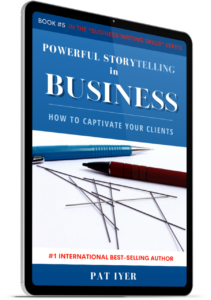While AI can’t write your story, that doesn’t mean it can’t write any stories. You could tell it to write something showing that crime doesn’t pay or to give you ideas for writing that kind of story. But would that be your story?
This question takes the debate about the legitimacy of artificial intelligence beyond plagiarism and ethics by focusing it on authenticity, on your unique voice. In my book, Powerful Story Telling in Business: How to Captivate Your Clients, I share a story about my grandparents.
When I was a child, one of the many reasons I loved to visit my grandparents was that my grandmother was a world-class storyteller. Her supply of stories seemed inexhaustible. They ranged from tales of her childhood, her life as a young married woman in rural Ireland, to the family’s emigration and settling in western Pennsylvania.
The following is a highly abbreviated version of one of her stories about living in Ireland.
My Uncle Bert, my grandparents’ second child, was a premature baby. They had no telephones, which meant that my grandfather’s brother had to go to the village and find the doctor. Bert, however, was in a hurry to be born. My grandfather had to step in as an emergency (and untrained) obstetrician.
My grandmother directed him as best she could, and he successfully delivered the baby and cut the umbilical cord. No sooner had he done this than the doctor came to the house. At that point, my big, strong, and often stoic grandfather fainted.
What did that story teach me?
When you face with a challenging situation, you don’t say, “I can’t do that.” You do it because you have no choice. This lesson was frequently reiterated in our family.
The other lesson was that you are perfectly entitled to collapse once a crisis is over and allow your body and spirit to recover.
These critical life lessons always stayed with me and served me well in many crises. Had someone simply told me, “Always do what you have to do” and “Collapse when the crisis is over,” I wouldn’t have taken these messages to heart as deeply as I did because of my grandmother’s vivid storytelling.
I Believe in the Power of Storytelling
 That’s why I wrote Powerful Story Telling in Business: How to Captivate Your Clients. Specifically, I wrote that story to illustrate how, instead of using the “This is what I do, and you should do it, too” model, you can express your approach to dealing with life and business issues with a story that didn’t preach or pontificate. Instead, it entertained while teaching. I wrote that story for two reasons. I also wanted to demonstrate how I learned the power of storytelling from my grandmother.
That’s why I wrote Powerful Story Telling in Business: How to Captivate Your Clients. Specifically, I wrote that story to illustrate how, instead of using the “This is what I do, and you should do it, too” model, you can express your approach to dealing with life and business issues with a story that didn’t preach or pontificate. Instead, it entertained while teaching. I wrote that story for two reasons. I also wanted to demonstrate how I learned the power of storytelling from my grandmother.
We learn to love stories when we’re young children. We associate them with comfort, attention, and entertainment. These powerful emotions revive whenever we have the opportunity to read or hear a story.
Beyond our individual histories, stories are in our DNA. Long before humankind knew how to read and write, people heard stories. Our ancestors used them to teach us, share values, and pass on the cultural framework of our lives.
As an expert witness, I shared stories of patients who had suffered medical malpractice. More than statistics, these stories painted pictures that emotionally moved jurors.
Stories are the most powerful writing tools you have. When you write your story
- They make your blog posts, articles, and other writing interesting.
- They tell readers who you are.
- A story that entertains helps readers to like you and want to know you better.
- A story that addresses universal challenges and issues establishes a connection between you and a reader.
Artificial Intelligence Couldn’t Have Written That Story
I could have prompted an AI program until the end of time without it coming up with this story. Maybe it could have provided something generic about the life lesson I wanted to share, but the story wouldn’t have been mine.
“ChatGPT Is a language tool. She can’t replace you. She can’t think.” Wendy Barr
And that’s essential. The bulleted points make it clear that a primary value of a story is that it arises from your unique life experiences.
In a way, stories are like dreams (which are in themselves stories). They emerge from your unconscious.
I don’t remember exactly how that story came into my conscious awareness. Maybe it popped up, and I knew it had something to tell me. (This is why I recommend writing down any personal story that comes into your mind. A stockpile of stories provides the best writing prompts I know.)
Maybe I directly asked my unconscious, “What story would capture the essence of what I want to write about?” I recommend asking this question. Your unconscious mind isn’t the dark hole of Freudian psychoanalysis but a rich source of information and guidance. It helps you write your story again and again.
Artificial intelligence doesn’t have an unconscious. It doesn’t have your memories. It doesn’t know who you are, even in the most general sense. It doesn’t know your feelings, and it doesn’t know what makes you unique.
It doesn’t know what makes your stories yours. Only you can ever know that.
 Pat Iyer MSN RN LNCC is a consultant, speaker, author, editor and coach. She has written or edited over 60 of her own books and worked with a few dozen authors. Pat is an Amazon international #1 bestselling author. Coaches, consultants, and speakers hire Pat to help release the knowledge inside them so that they can attract their ideal clients.
Pat Iyer MSN RN LNCC is a consultant, speaker, author, editor and coach. She has written or edited over 60 of her own books and worked with a few dozen authors. Pat is an Amazon international #1 bestselling author. Coaches, consultants, and speakers hire Pat to help release the knowledge inside them so that they can attract their ideal clients.
She delights in assisting people to share their expertise by writing. Pat serves international and national experts as an editor, book coach, and a medical and business writer.
